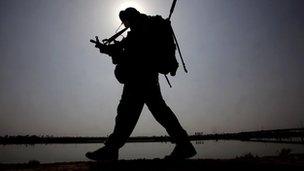Military 'must attend Iraq inquiries', High Court rules
- Published

The two judges called for the inquiries to start as soon as practicable
Military personnel must attend inquiries into claims British troops abused and unlawfully killed civilians in Iraq if they are to be effective, the High Court has ruled.
Two judges said the "overwhelming probability" was that soldiers would be reluctant to give evidence otherwise.
The guidelines follow a ruling earlier in May which said a "new approach" into the allegations was needed.
Lawyers representing 180 civilians had called for a full public inquiry.
The court in May stopped short of ordering such an inquiry, but said there should be a series of further investigations into the allegations.
Allegations of mistreatment include sexual abuse, food, water and sleep deprivation, prolonged solitary confinement, mock executions and being denied clothes.
It is also alleged British soldiers and interrogators were guilty of unlawful killings as well as torture in British-controlled detention facilities in Iraq between March 2003 and December 2009.
Sitting in London, Sir John Thomas, who has just become the new Lord Chief Justice of England and Wales, and Mr Justice Silber, said there was a "real risk" that military personnel would not give evidence "as to what happened in a meaningful way".
'Only fair way'
They said it was essential that an inspector conducting an inquiry was "able to determine how each death occurred if the inquiry is to be effective" and the best evidence would be from those who were present.
But in their view "the overwhelming probability is that soldiers will be reluctant to give evidence at all and certainly to give evidence that involves any significant criticism of a colleague".
In a written judgment giving guidelines on the future conduct of the inquiries, Sir John concluded: "Thus a form of inquiry where such persons can be compelled to attend will be the only effective and fair way of determining what happened.
The two judges described the task ahead as "unprecedented" and called for inquiries to start as soon as practicable.
In cases where there had been previously failed prosecutions "realistic decisions must be made in the very near future," they said.
And in cases where there had been no criminal process the judges said they would "find it difficult to see what justification there could be for failing to reach a decision on prosecution by the end of 2013".
Each inquiry "should be established by the appointment of a suitable person such as a retired judge or possibly a very experienced practitioner to conduct the inquiry" and must be public, they said.
Witnesses living in Iraq should be able to give their evidence by videolink, they added.
'Another milestone'
Phil Shiner, of Public Interest Lawyers, which represents "hundreds of clients who stand to benefit from these inquiries", said the latest judgment "marks another milestone in ensuring that accountability is achieved for hundreds of Iraqi civilians".
In May the two judges in London ruled the Ministry of Defence's Iraq Historic Allegations Team (IHAT), which was set up to investigate the claims, was independent.
But they concluded that the IHAT investigation at that stage "did not fulfil" the UK's human rights obligations under Article 2 of the European Convention on Human Rights.
That article covers the duty to investigate suspicious deaths.
The two senior judges were told there might be as many as 150 to 160 cases involving deaths and between 700 and 800 cases involving mistreatment of civilians in breach of Article 3 of the ECHR, which prohibits inhuman and degrading treatment.
Two public inquiries have already been launched into similar abuse claims.
The first inquiry was into the death of 26-year-old hotel worker Baha Mousa in UK military custody in September 2003. It concluded in September 2011, with inquiry chairman Sir William Gage blaming "corporate failure" at the Ministry of Defence for the use of banned interrogation methods in Iraq.
And the ongoing Al-Sweady inquiry is looking at allegations that the human rights of a number of Iraqi nationals were abused by British troops in the aftermath of a firefight in 2004 near Majar al Kabir.
In May, the judges said the Baha Mousa Inquiry cost £25m, and the Al-Sweady Inquiry has cost £17m so far.
- Published24 May 2013
- Published29 January 2013
- Published5 November 2010